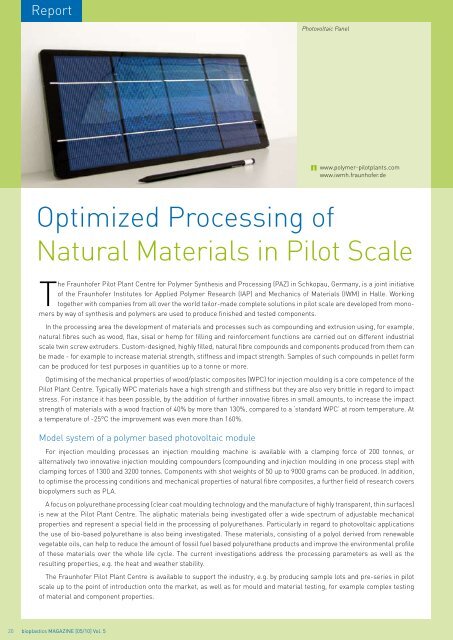05 | 2010
You also want an ePaper? Increase the reach of your titles
YUMPU automatically turns print PDFs into web optimized ePapers that Google loves.
Report<br />
Photovoltaic Panel<br />
www.polymer-pilotplants.com<br />
www.iwmh.fraunhofer.de<br />
Optimized Processing of<br />
Natural Materials in Pilot Scale<br />
The Fraunhofer Pilot Plant Centre for Polymer Synthesis and Processing (PAZ) in Schkopau, Germany, is a joint initiative<br />
of the Fraunhofer Institutes for Applied Polymer Research (IAP) and Mechanics of Materials (IWM) in Halle. Working<br />
together with companies from all over the world tailor-made complete solutions in pilot scale are developed from monomers<br />
by way of synthesis and polymers are used to produce finished and tested components.<br />
In the processing area the development of materials and processes such as compounding and extrusion using, for example,<br />
natural fibres such as wood, flax, sisal or hemp for filling and reinforcement functions are carried out on different industrial<br />
scale twin screw extruders. Custom-designed, highly filled, natural fibre compounds and components produced from them can<br />
be made - for example to increase material strength, stiffness and impact strength. Samples of such compounds in pellet form<br />
can be produced for test purposes in quantities up to a tonne or more.<br />
Optimising of the mechanical properties of wood/plastic composites (WPC) for injection moulding is a core competence of the<br />
Pilot Plant Centre. Typically WPC materials have a high strength and stiffness but they are also very brittle in regard to impact<br />
stress. For instance it has been possible, by the addition of further innovative fibres in small amounts, to increase the impact<br />
strength of materials with a wood fraction of 40% by more than 130%, compared to a ‘standard WPC’ at room temperature. At<br />
a temperature of -25°C the improvement was even more than 160%.<br />
Model system of a polymer based photovoltaic module<br />
For injection moulding processes an injection moulding machine is available with a clamping force of 200 tonnes, or<br />
alternatively two innovative injection moulding compounders (compounding and injection moulding in one process step) with<br />
clamping forces of 1300 and 3200 tonnes. Components with shot weights of 50 up to 9000 grams can be produced. In addition,<br />
to optimise the processing conditions and mechanical properties of natural fibre composites, a further field of research covers<br />
biopolymers such as PLA.<br />
A focus on polyurethane processing (clear coat moulding technology and the manufacture of highly transparent, thin surfaces)<br />
is new at the Pilot Plant Centre. The aliphatic materials being investigated offer a wide spectrum of adjustable mechanical<br />
properties and represent a special field in the processing of polyurethanes. Particularly in regard to photovoltaic applications<br />
the use of bio-based polyurethane is also being investigated. These materials, consisting of a polyol derived from renewable<br />
vegetable oils, can help to reduce the amount of fossil fuel based polyurethane products and improve the environmental profile<br />
of these materials over the whole life cycle. The current investigations address the processing parameters as well as the<br />
resulting properties, e.g. the heat and weather stability.<br />
The Fraunhofer Pilot Plant Centre is available to support the industry, e.g. by producing sample lots and pre-series in pilot<br />
scale up to the point of introduction onto the market, as well as for mould and material testing, for example complex testing<br />
of material and component properties.<br />
20 bioplastics MAGAZINE [<strong>05</strong>/10] Vol. 5


















